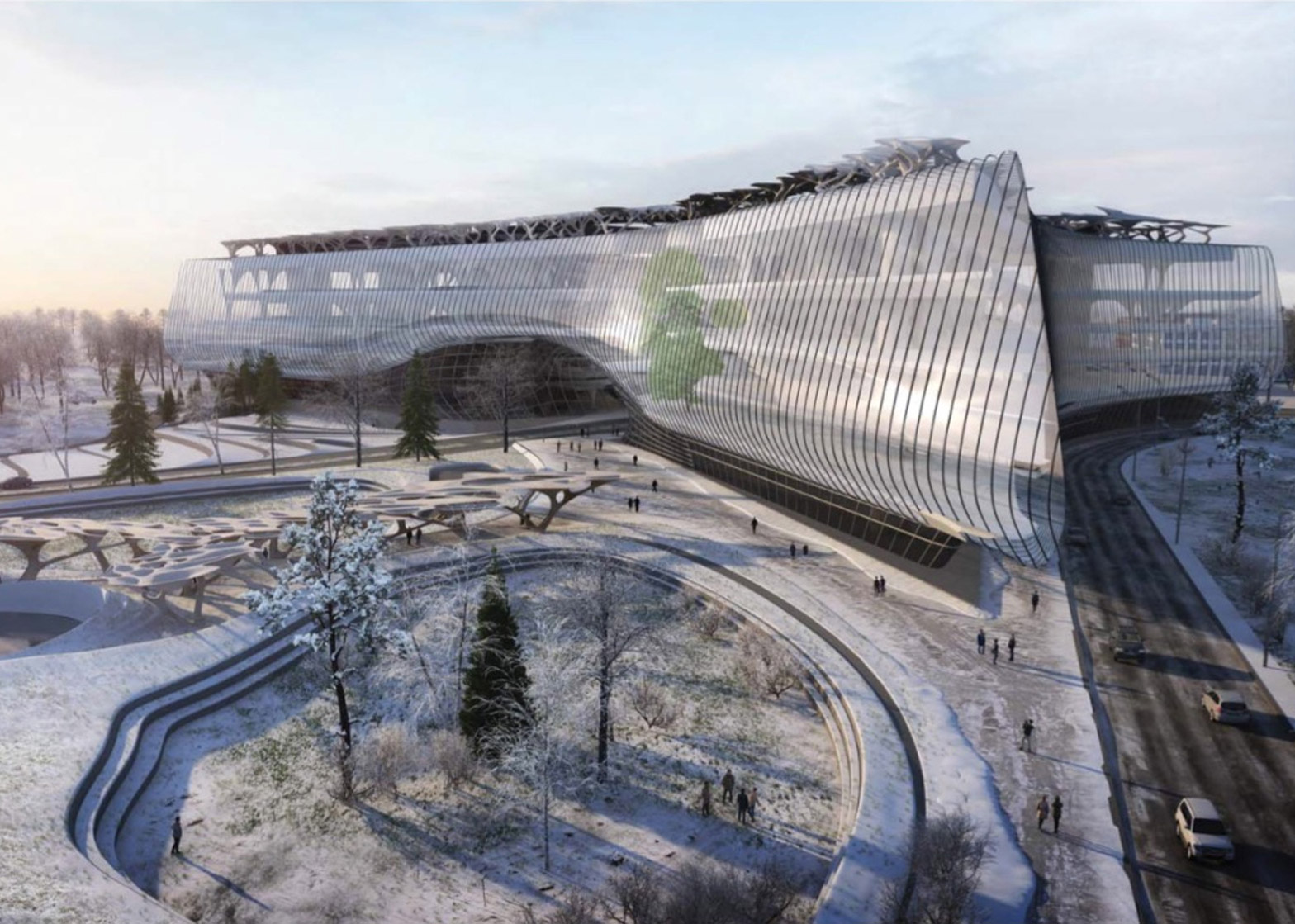Zaha Hadid Architects has been selected to design a building for a technology park near Moscow, the first major project the firm has secured since the death of its founder last month.
Zaha Hadid Architects won an international design competition for the Sberbank Technopark building, which will be built at the Skolkovo Innovation Center near the Russian city. The new science and technology park – designed to host emerging IT, biomedical, energy, nuclear and space innovation companies – is said to be Russia's answer to Silicon Valley.
The 131,000-square-metre Sberbank Technopark will feature a curving glass facade with an arched opening through its centre. It will house 10-12,000 technical employees of the Russian bank Sberbank.
"The design reconfigures working relationships and adopts a holistic approach to creating an engaging environment that offers a diversified range of facilities both internally and externally," said project director Christos Passas.
The project references Hadid's well-documented interest in the Russian Avant-Garde, first explored with her graduation project in 1976-7 at the AA school in London.
"The incredible belief in the power of invention attracted Zaha Hadid to the Russian Avant-Garde," added Passas.
"She realised how architecture can enrich creativity; how space itself can enhance dynamism, complexity, coherence and continuity. These principles are embedded within the Sberbank Technopark design."
Zaha Hadid Architects, which recently announced it would carry on without its late founder, saw off competition from British firm Foster + Partners, American office Eric Owen Moss Architects, Russian studio SPEECH and Fuksas from Italy for the project.
Renderings of the building's interior show floorplates supported by a network of sinuous columns and a light-drenched atrium with pockets of planting.
"We appraised the advanced achievements of modern architectural science that will be used to create our unique facility," said Sberbank's CEO Herman Gref. "Sberbank's technopark will become a centre of expertise for the company and a driver of IT innovation."
Zaha Hadid Architects completed it's first major project in Moscow – a nine-storey office block with jutting floor plates and a monochrome atrium – in 2015.
Work is expected to begin on Sberbank Technopark in 18 months and take two years to complete.
Architects David Chipperfield, Stefano Boeri, Kazuyo Sejima, Mohsen Mostafavi, Sergei Tchoban, Sergey Kuznetsov, Yury Grigoryan, Pierre de Meuron and Rem Koolhaas also said to be contributing projects to the Skolkovo Innovation Center scheme.
Iraqi-born British architect Zaha Hadid died aged 65 from a heart attack while being treated for bronchitis at a Miami hospital.
Her London-based firm recently announced it would continue work to complete the 36 projects that were under development in 21 countries at the time of her death.
"Zaha is in the DNA of Zaha Hadid Architects. She continues to drive and inspire us every day, and we work on as Zaha taught us – with curiosity, integrity, passion and determination," said a statement issued by the firm at the time.
The Salerno Maritime Terminal was the first of the four existing projects to complete this year. The new terminal for ferries and cruise ships features the undulating curves that are characteristic of Hadid's design.
Project credits:
Architecture and landscape design: Zaha Hadid Architects (ZHA)
ZHA design: Zaha Hadid and Patrik Schumacher
ZHA design director: Christos Passas
ZHA project architect: Eider Fernandez
ZHA project team: Veronika Ilinskaya, Spyridon Kaprinis, Chrysi Fradellou, Bruno Perreira, Ben Kikkawa, Melhem Sfeir, Sergey Krupin, Faten El Meri, Reza Esmaeeli, Nicos Yiatros, Emily Rohrer, Uli Blum, Adam Twigger and Tam Cader
Structural design: AKT2
AKT2 design director: Daniel Bosia
MEP/environmental systems: Atelier Ten
Atelier Ten director: Meredith Davey
Atelier Ten project lead: Younha Rhee
Lighting design: OVI Lighting
OVI directors: Jean Sundin and Enrique Peiniger
Cost consultant: RLB International
RLB project lead: Gary Danks
RLB: Andrew Blythe

